MBA for Indian Defense Veterans
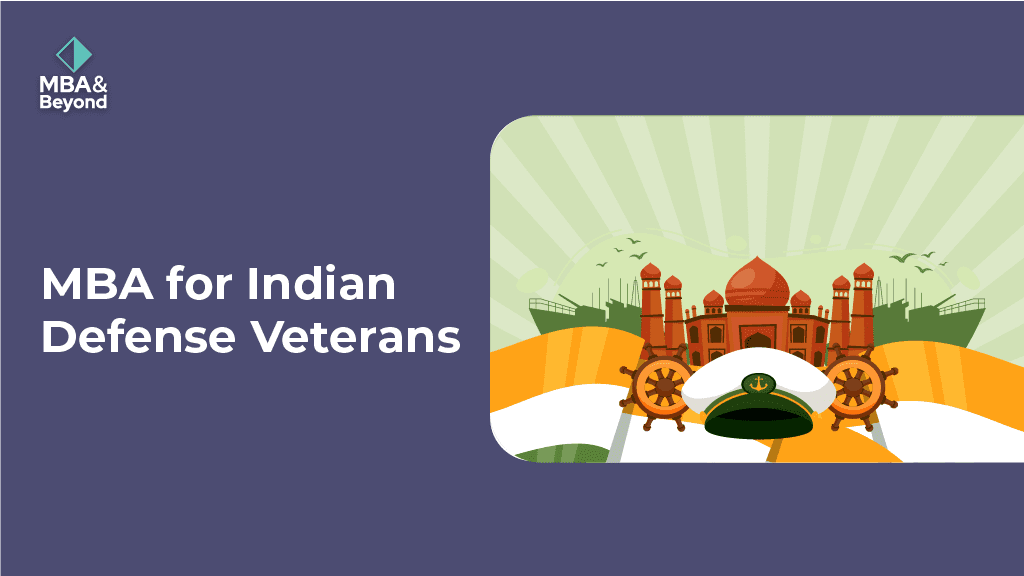
If you’ve found your way here on this article, you’re either a veteran or currently serving in the Indian Army, Navy, or Air Force, and you’re thinking about pursuing an MBA when you leave your current job.
However, you’re unsure about the do’s and don’ts of the application process and wondering how to get into a top B-school.
At MBA and Beyond, we try to answer as many questions as possible and guide you on the right path because we care about your future.
This article is all about your possible queries, and we will try to answer those questions, so let’s get started.
DIFFERENCE BETWEEN CORPORATE JOBS AND THE INDIAN DEFENCE SECTOR.
When we think of the Indian army/navy/airforce, one phrase that usually comes to mind is “service before self.” This is more than just a simple line to follow; it is their mindset.
With that in mind, let’s look at the key differences between these two sectors.
| INDIAN ARMY/NAVY/AIRFORCE | CORPORATE JOBS |
|---|---|
| Military personnel are exposed to high-level challenges in terms of operations or even logistics, and remember, we’re not just talking about the war scenario; Even when there isn’t a war, they work and lead the team and make decisions in the most extreme conditions, making them good leaders. | Private sector growth When it comes to money, you may increase three times in a year; however, this is not conceivable in the defense sector. |
WHY MBA FOR VETERANS?
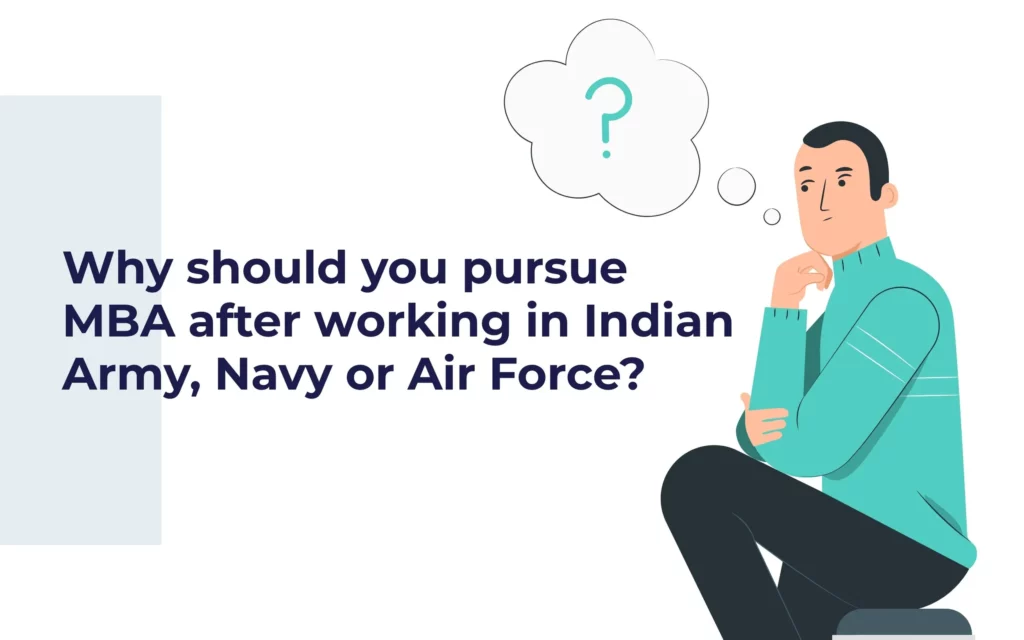
When they finish serving the country with all their dedication, they always think of a job that will pay them as much as the defense sector did, but when they try to switch into the private sector, the business world is not waiting for them with arms open.
Armed Forces personnel have a non-traditional background, making it difficult to adapt from a highly specialized to a corporate environment. This is where having an MBA may help you obtain what you desire.
WHAT DIFFERENTIATES DEFENCE PERSONNEL WHO HAVE AN MBA WHEN COMPARED TO TRADITIONAL MBA STUDENTS?
Ex-Indian Army, Navy, and Air Force veterans always have a stronghold regarding experience and the qualities that the private sector requires
This is where traditional MBA students fall short; traditional MBA students may have experience, but it is minimal compared to military veterans.
| MBA for Veterans | MBA for Students with Traditional Backgrounds |
|---|---|
| Military veterans have a lot more practical experience than conventional MBA students since they served their country and learned how to manage a much bigger group in various scenarios For example, they have work experience of 10-15 years before going into a different sector. | They have experience, but it pales compared to the years of service that a military veteran has. |
| One of the veteran’s strong suits is crisis management; years of experience have taught them how to deal with a problem in the worst-case situation. The day you join the training in the military, they teach you how to handle a real-life crisis, which gives a military veteran a plus point. | Both industries deal with the crisis, but a newcomer or someone with less than two years of experience may find it challenging to deal with it. |
| Former soldiers are known for their leadership qualities. But a formal MBA is necessary to educate you on applying your leadership in the corporate world to flourish in the commercial sector. | Many individuals avoid making decisions because they lack leadership qualities. |
Want to pursue an MBA but not sure if your profile fits?
Talk to our Profile Experts to know your chances for a top MBA Program.
GET A FREE PROFILE ANALYSISCHALLENGES AND BARRIERS YOU MAY ENCOUNTER DURING THE PROCESS
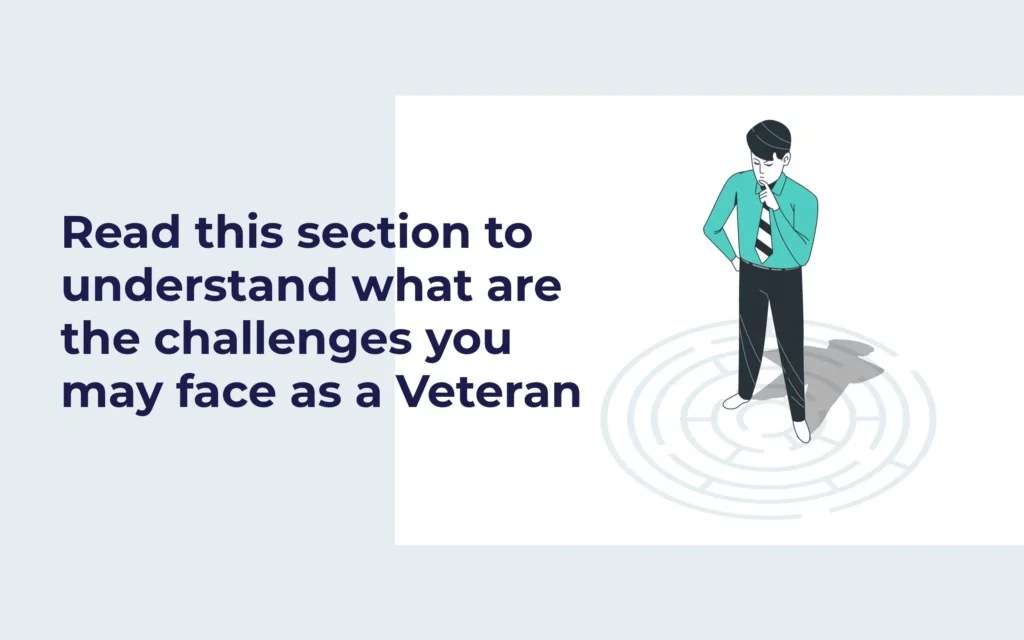
After several years in the military, you learn many things, but you may encounter numerous problems and difficulties when you apply for an MBA after your service. As a result, we’ll talk about such issues in this section.
Having experience is one thing, but putting that expertise on a piece of paper makes it extremely difficult to convey to a civilian.
Military training differs significantly from that provided by a traditional MBA. With that stated, military personnel may find it challenging to persuade admissions officers that their strategy to shift into a corporate position after receiving an MBA is well thought and processed.
Due to the lack of understanding on who to contact for information on the enrollment process, people wander on different websites,
This is the step when assistance from people who have gone through the process of enrolling into a B-school comes in handy.
GMAT BASED MBA FOR INDIAN ARMY/NAVY/AIRFORCE
It is difficult for a military veteran to shift from military to civilian life; here is where a top business school can assist them. However, if you want to attend one of the top B-schools, you must pass the GMAT exam and obtain a decent score to select your preferred institution.
A few prominent Indian institutes immediately come to mind when you think about doing an MBA, such as ISB and IIM. The admission exam (CAT) that they use is not accepted worldwide; that is where GMAT comes in; GMAT scores are accepted by Indian colleges, so why not take the GMAT and expand your options?
With that in mind, we’ve narrowed down and attempted to provide you with an overview of the best institutions that accept the GMAT, as well as a breakdown so that you can properly understand it.
TOP MBA PROGRAMS FOR INDIAN ARMY/NAVY/AIR FORCE
We have a comprehensive breakdown of the GMAT score based on Quant and Verbal and statistics on the minimal GMAT score accepted below.
*Data collected from different sources please visit the official website for accurate information*
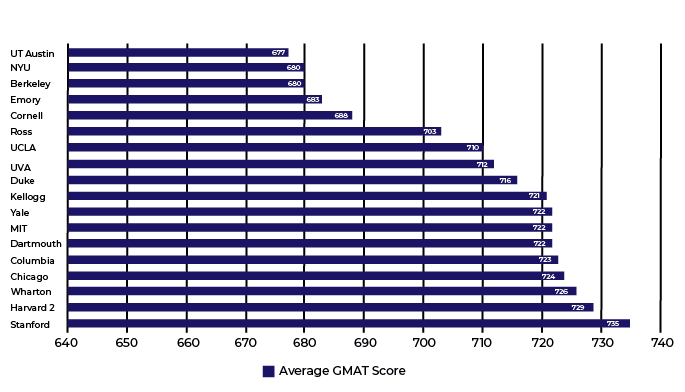
Average GMAT score of accepted Military applicants
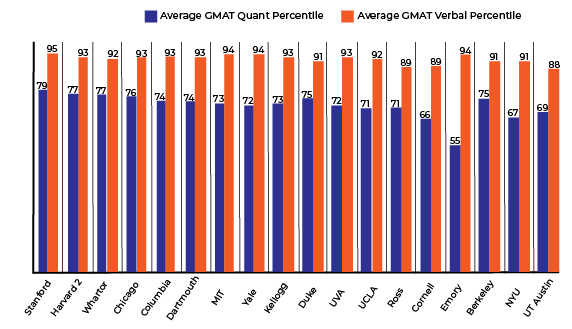
Breakdown of GMAT score based on Quant and Verbal section
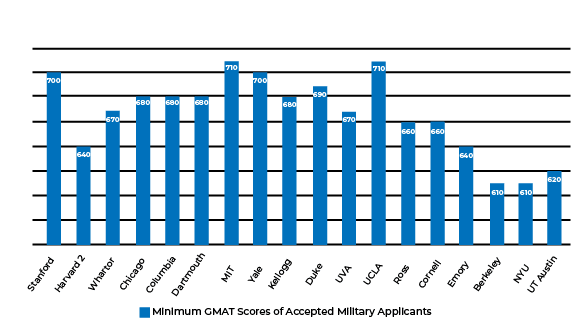
Minimum GMAT scores of accepted Military applicants
THE MILITARY ACCEPTANCE RATE IN TOP B-SCHOOLS
Tier 1 colleges ranked from 1-7:- Harvard, Wharton, Booth, Stanford, Sloan, Kellogg, and Haas
Tier 2 colleges ranked from 8-14:- tuck, Yale, Columbia, Ross, Stern, Fuqua, and Darden.
Tier 3 colleges ranked from 15-25: Anderson, Johnson, McCombs, Kenan-Flagler, Tepper, Goizueta, McDonough, Kelley, Olin, Marshall, Carey, and Owen.
WHAT KIND OF JOB ROLES TO EXPECT AFTER AN MBA DEGREE AS A DEFENCE VETERAN?

There are several options for military veterans after completing their MBA degree; mentioned below are a few top job profiles that may help you earn more than other occupations.
Because of their military expertise, they are given precedence in operations, human resources, and other sectors which require leadership abilities.
Analyst for business operations and management – The Analyst’s role is to evaluate corporate functions and collaborate with cross-functional teams to implement process modifications. Operations Analysts significantly impact a firm’s operations by utilizing technology, strong communication skills, documentation skills, and reporting. Analysts who work in business operations and management earn about $120,000 per year.
Handling Logistics ( Logistics Officer ) – They plan, coordinate, and establish contingency plans for their activities. Logistics officers collaborate with other groups to ensure that tasks go well. The average salary for a logistics officer is more than $100,000 per year.
Manager of finances – Being in the military does not always imply working in the field; there are desk occupations. They are highly prepared to handle those desk jobs, so managing a military vet’s finances can be easier than a traditional MBA. Financial managers define financial priorities and performance standards. They communicate their findings and strategic solutions to senior leadership to maximize resource utilization efficiency in military operations.
Apart from these career descriptions, an army veteran with an MBA can find hundreds of work opportunities.
Management analyst (average annual salary: $78,160)
Database administrator (median annual salary: $73,490)
Accountant (average annual salary: $61,690)
A financial adviser (average annual salary: $64,750)
HR expert (average annual salary: $52,690).
you must have examined all of the above aspects; you now have a greater grasp of the process and what you should remember before taking the test.
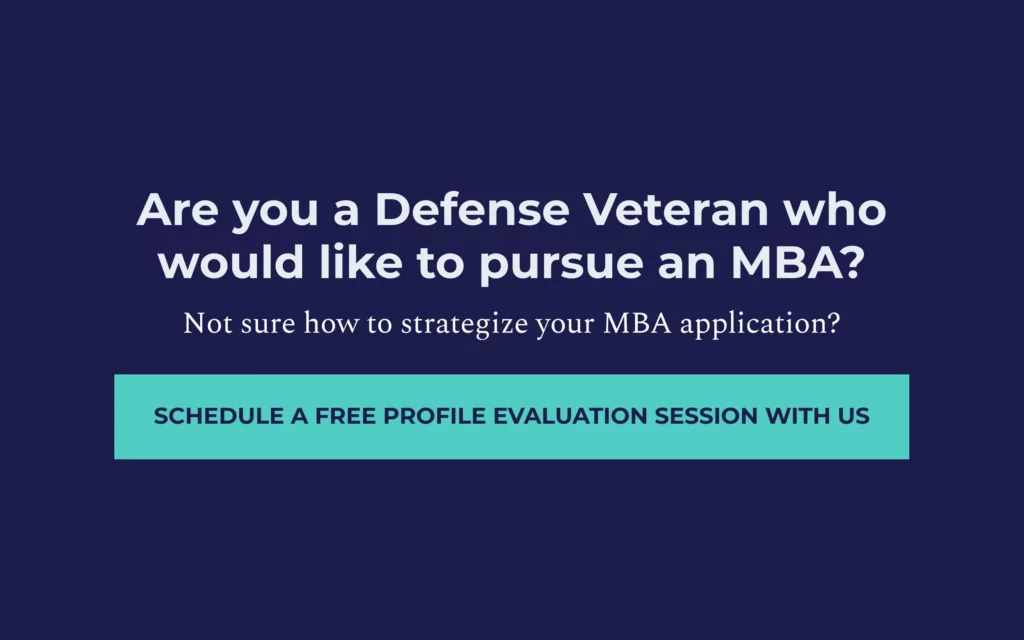
Why not speak with an expert and get your questions answered for free? So what are you waiting for? Explore the possibilities with our expert.




Leave a Reply